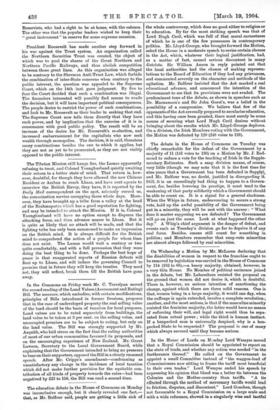the whole controversy, which does no good either to religion
or to education. By far the most striking speech was that of Lord Hugh Cecil, which was full of that moral earnestness of which he is one of the few possessors in contemporary politics. Mr. Lloyd-George, who brought forward the Motion, asked the House in a moderate speech to revise certain clauses in the Act, which, whatever their logical justification, had, as a matter of fact, caused serious discontent in many districts. Sir William Anson in reply pointed out that the local authorities had the chance of making represen- tations to the Board of Education if they had any grievances, and commented severely on the character and methods of the agitation. Mr. Balfour insisted that the Act marked a real educational advance, and announced the intention of the Government to see that its provisions were not evaded. The predominant tone of the debate, as shown in speeches such as Dr. Macnamara's and Sir John Gorst's, was a belief in the possibility of a compromise. We believe that few of the opponents of the Act are really prepared to secularise education, and this having once been granted, there must surely be some means of securing what Lord Hugh Cecil desires without bringing about the results which Mr. Lloyd-George deplores. On a division, the Irish Members voting with the Government, the Motion was defeated by 120 (248 votes to 128).










































 Previous page
Previous page